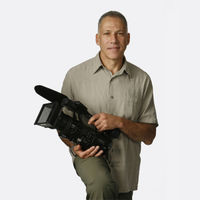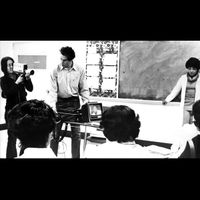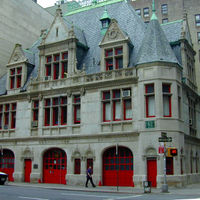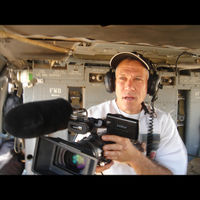Jon Alpert founder of DCTV, legendary reporter and innovator
DCTV has moved to a tapeless camcorder workflow and is installing a new LaCie based data storage center.
Published Jun 7, 2010
[an error occurred while processing this directive]
Edit page New page Hide edit links
Jon Alpert is an Independent Film pioneer. You could even call him a founding father if you wanted to. That’s because he has been at the forefront of independent filmmaking technology since the early 1970’s. This documentary filmmaker was blacklisted from traditional mainstream media including PBS for his passion to record and show the underside of humanity. Fast forward 40 years to a new home with HBO and a documentary Oscar nomination. Jon is both a legend and relevant inspiration to all documentary filmmakers.
As an investigative journalist he has interviewed Fidel Castro and Saddam Hussein. In both instances beating out major networks for the story. He has reported from Vietnam, Cambodia, Iran, Nicaragua, the Philippines, Cuba, China, the Soviet Union and Afghanistan. As a filmmaker he has been shot at and bombed.
In 1977 he directed “Vietnam: Picking Up The Pieces”. This was first time an American television crew had filmed inside Vietnam since the war had ended in 1975. He was also invited to document Jesse Jackson’s delegation to Yugoslavia when Jesse helped broker the release of the 3 American POW’s; successfully.
Jon recently received an Academy Award nomination for his documentary “China's Unnatural Disaster: The Tears of Sichuan Province”.
His resume is mind blowing. His ability to chase stories and interviews is legendary. Most importantly Jon Alpert is at the forefront of technological advances including his move to solid state camcorders and a new LaCie network storage installation for his DCTV community media center in lower manhattan.
Was Jon Alpert responsible for converting NBC news from film to video tape?
Then we started using the LaCie drives and they are bullet prove. I’m trusting LaCie with footage I’ve risked my life to get and their drives have worked flawlessly.
Jon Alpert - “In 1974 I was in Cuba. We were using the very first portable color video unit. It was a reel to reel JVC deck. And I cant tell you how many problems we had with that unit. The color tied in with the luma channel so you couldn’t even pan the camera. Green turned to blue and it was very sensative. Even out doors we had to use a light kit."
"So no TV crew had ever been to Cuba and no one here wanted to talk to us. The vice president of NBC news at the time said that they wouldn’t take anything from independents. But he did ask if he could play the tape to his engineers."
Jon was granted one of the first video interviews with Fidel Castro.
"He plays the tape..."
‘O.K. men. What do you think this was shot on?’ The first engineer says, ‘ 16mm’. The next engineer says, “35mm’.
‘Anyone else?’
"At the time the only other format was a tape deck that was the size of a small piano. If that was it the engineers thought then well how the heck did they get one of those into Cuba?"
"We shot with a new JVC tape reel to reel video deck. When the engineers were told what it was then all of a sudden they said ‘Oh, look at this. This is horrible. Here is this flaw and that flaw.’"
"The NBC executive said ‘They’re full of shit! Watch this.’ He immediately ordered 200 decks from Sony."
"And that was the beginning of an engineering revolution in television."
"They were so burned by being resistant to technology that they let us get 3 or four laps ahead of them."
I can relate to Jon in his enthusiam for the video revolution. As he was describing to me the change that NBC news made when they switched over to video, I was remembering the shift from analog video to digital video when I was in college. The ability to shoot and edit from home and not in an edit room somewhere was almost unthinkable at the time. And now the recent shift to hand held professional HD camcorders. Technology is always moving forward, non-stop.
Jon founded DCTV with his wife in 1972 to help foster filmmaking with free or low cost production courses. And DCTV offers low cost video production equipment 7 days a week. One of the advantages of renting camcorders through DCTV is that they do not require rental insurance.
I was curious about what Jon thought of the changes that have taken place over the last three decades. Considering that there were no editing decks for video tape based camcorders when they were new to the market.
Jon Alpert - “Those days were exciting cause tech was so new. The ability to record and play it right from the camera was very attractive to us. We didn't' have the training or finances to work with film. Film is very expensive to work with. The early video cameras were primitive but gratifying. You didn't have to wait. But the equipment sometimes wasn't your friend and you would be thinking you were recording something important but you would see a huge pile of spaghetti where the tape was supposed to be.”
Jon of course was referring to the tendancy of an early camcorder to not only suffer from tape jams, but to keep rolling and spill tape from the take-up reel on to the ground.
Jon Alpert - “You also had to use a razor to edit the tape. There were no edit decks in those days. And the early camcorders only had one track of audio. We discovered that you could get a second track of audio over the first if you rewound the tape and put a pice of cardboard between tape and the tape head. You essentially could erase some or all of the audio with varying ammonts of thickness with cardboard to experiment with two tracks. But of course both layers would be on the same track so you only had one chance at it.”
“The edit decks in those days were a misnomer. They used to catch on fire all the time. We had to have a fire extinguisher next to the deck. And we had to adjust the speed for each edit. And none of the other decks in town were compatible with anyone elses. It did provide a learning opportunity for guys like us. You just figure it out as you go along.”
The rise of the handheld HD camcorder has coincided with increased acceptance from mainstream media. No longer are the days where local news stations are shooting with 30,000 or even 80,000 dollar cameras. With what I have witnessed out in the field as a reporter with IndependentFilm.com I am seeing news crews with small shoulder mounted cameras from JVC and even smaller ones from Sony and Panasonic. And now all tapeless to internal solid state media. The lines have been blurred either because independents for the first time have professional quality cameras within their grasp, or maybe the professional news crews can get away with using the same cameras as us independents. We’ll never know. It’s academic. Who cares really. The point is right now 'ProSumers' are shooting with the same cameras as the local and sometimes national news.
Back in the 1970s there were up to 6 or 7 community media centers in New York. DCTV is the last of them primarily because of their ability to stay relevant. And they own the building and are not subject to astronomical rent increases. After visiting the NAB show two years ago and seeing the tape-less camcorders Jon Alpert came back to New York and told the his folks at DCTV they would soon be shooting on solid state media. No more tape.
Jon Alpert - “I have never had a good relationship with tape. We lost all of our historical tapes due to a flood. A torrential spring rain flooded our roof and the water drains had gotten clogged up. We hired a crew to fix the plumbing. They took out two wrenches and whacked the pipes and then these guys start running away from a tidal wave of water. They didn't drain the roof first so that washed out our entire library. Every single tape was washed away and it ruined our archives."
"I tested the Sony tape-less EX1's and now the EX-3’s. The picture is really nice. We did a comparison test with simpler cameras and at HBO they forbade you make documentaries on small format cameras. After they saw the results they authorized it for all their documentaries.”
“But, you don't have a hard copy of what your shooting when your are halfway around the world. So you really need to have faith in where you are storing your footage.”
“You also begin to need more and more storage space. You are chewing up data at a very rapid rate.”
“We weren't making any type of back up of our medium. We didn't have time or money to do it. So we just hoped the drives were reliable. Then we started using the LaCie drives and they are bullet prove. I’m trusting LaCie with footage I’ve risked my life to get and their drives have worked flawlessly.”
DCTV is currently installing a LaCie 12big multiple terabyte data command center. All of the rooms will be able to share and have access to the same media files. Multiple editors will be connected by fiber optics. With this latest technology upgrade DCTV is well positioned to continue to be at the forefront of change.
Jon is currently shooting a documentary about returning Gulf War soldiers with PTSD (Post Traumatic Stress Disorder) for HBO.
[In Technology]
Additional Events at ProFusion 2011, DV Expo East, and Columbia College Chicago May 26, 2011
[In Resources]
Fest to fete special guests Vera Farmiga, Paul Haggis; Mike O’Malley joins Anne Meara as hosts of Late Night Storytelling May 26, 2011







Add a Comment
Please be civil.